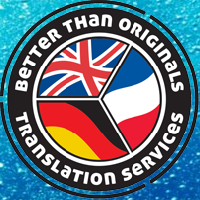| Pages in topic: [1 2] > | Soliciting direct clients - source or target language? Thread poster: Joseph Schreiner
|
|---|
Hello to all,
I am a part-time translator about to become a full-time translator. I believe that the next logical step for me is to make targeted solicitations to direct clients. My question is: Should I write my solicitations in the source language, or the target language?
I primarily translate technical/engineering German -> English, but I also do some French -> English. I would be writing emails offering my services to German and French companies. I believe it would ... See more Hello to all,
I am a part-time translator about to become a full-time translator. I believe that the next logical step for me is to make targeted solicitations to direct clients. My question is: Should I write my solicitations in the source language, or the target language?
I primarily translate technical/engineering German -> English, but I also do some French -> English. I would be writing emails offering my services to German and French companies. I believe it would be better to communicate with potential clients in their native languages, German and French, but I have some doubts about my ability to write convincing correspondence in German and French. I am certain that I could write grammatically correct correspondence in these languages, but I suspect that they will read a little oddly to native speakers. Naturally, I am confident in my ability to write appropriate correspondence in English. But this is not the first language of my potential clients.
I have thought about having standardized text translated from English -> German/French, and then basing my correspondence on that text. But I may not be able to customize this text in a targeted way for each potential client.
I offer my language pairs as an example, but I am certain that this is an issue for those who translate other language pairs. I also wonder if there might be differences among specialties (technical vs. legal, for example). Forgive me if I am rehashing an issue that has already been discussed in another thread.
Would any of you like to share your thoughts, observations or experiences in this matter?
Joseph Schreiner ▲ Collapse
| | | |
In the case of Germany, you should clearly write in German. It has to be said that Germans are very sensitive to a proper use of the language, and the higher your level of German and your knowledge of German people and culture, the higher the consideration you will get from German businesspeople and Germans in general. If you try to communicate with them with a poor German, they will subconsciously question your abilities and your character, even if reason tells them that you are a perfectly cap... See more In the case of Germany, you should clearly write in German. It has to be said that Germans are very sensitive to a proper use of the language, and the higher your level of German and your knowledge of German people and culture, the higher the consideration you will get from German businesspeople and Germans in general. If you try to communicate with them with a poor German, they will subconsciously question your abilities and your character, even if reason tells them that you are a perfectly capable professional.
This is just a personal opinion, but the minimum level of German I would expect a translator to have is a C1 level in the Common European Framework for Reference for Languages (CEFR), so it might be a good idea to keep progressing with the language and try to obtain a higher qualification before you endeavour to work for big direct customers in Germany.
In the meantime, you might give it a try with smaller firms or translation agencies in Germany, as a way to hone your business communication skills in German.
Good luck! ▲ Collapse
| | | | xxLecraxx (X)
Germany
Local time: 13:58
French to German
+ ...
This is just a personal opinion, but the minimum level of German I would expect a translator to have is a C1 level in the Common European Framework for Reference for Languages (CEFR), so it might be a good idea to keep progressing with the language and try to obtain a higher qualification before you endeavour to work for big direct customers in Germany.
C1 doesn't mean you can write exactly like a native speaker. Even C2 doesn't mean you make no mistakes at all... However, as a translator, your passive (reading) level should definitely be C2 imho.
Many translators aren't capable of communicating (writing and speaking) in their source language(s) at all, which doesn't hinder them from successfully translating into their mother tongue. I don't know what they do to solicit clients in the country of the source language(s). I'd like to learn about that, too.
| | | | Sheila Wilson 
Spain
Local time: 12:58
Member (2007)
English
+ ...
| Put yourself in the client's shoes | May 31, 2014 |
It will then be obvious that it has to be in the client's own language, or at least your source language (bearing in mind that fewer and fewer people now are staying where they were born - a good current client of mine in Bulgaria prefers French to English but doesn't insist on Bulgarian fortunately).
It's up to you how you handle your approach. I wouldn't advise translation, but proofreading might be good. Remember that once you start corresponding, you'll need to reply promptly to... See more It will then be obvious that it has to be in the client's own language, or at least your source language (bearing in mind that fewer and fewer people now are staying where they were born - a good current client of mine in Bulgaria prefers French to English but doesn't insist on Bulgarian fortunately).
It's up to you how you handle your approach. I wouldn't advise translation, but proofreading might be good. Remember that once you start corresponding, you'll need to reply promptly to emails and maybe speak on the phone - you'll be on your own then.
I do find negotiating in French tricky, and chasing payment is stressful enough in English, let alone in French (in my case). I'm sure my French texts are understandable but I do find register a little difficult: in English one tends to be quite informal most of the time so it's easy to step up the formality; not so obvious (for me) in French.
As Tomás says, if you aren't sufficiently confident of your source language you should maybe do more studies. You can't rely on your client to get by in your language - who's the translator? ▲ Collapse
| | |
|
|
|
| try and make a team with native speakers of your source language | May 31, 2014 |
It's always useful to know some colleagues - reliable ones - who will be able to explain some expressions in your source language, proofread your e-mails, maybe translate a personal presentation for you. The clients will often need translations in the other direction, at that point you can propose your colleague, and the next time you'll see he will recommend you!
| | | | | make sure you scratch your head long enough before contacting direct clients | May 31, 2014 |
Joseph Schreiner wrote:
My question is: Should I write my solicitations in the source language, or the target language?
To me the obvious answer is source language. As said Sheila, if those potential clients would understand/speak your language it's likely they wouldn't need you... English is no exception despite being the world's lingua franca. Germans are certainly more English-friendly than the French (who are not very good at languages as a rule), but of course it doesn't mean they are fluent...
I believe it would be better to communicate with potential clients in their native languages, German and French, but I have some doubts about my ability to write convincing correspondence in German and French. I am certain that I could write grammatically correct correspondence in these languages, but I suspect that they will read a little oddly to native speakers.
Even translators who are more or less fluent in their source languages (definitely not all, and as Marcel said it's no hindrance to brilliance) face this issue. Making no mistake is often not enough to catch direct clients - you must use accurate words and idiomatic turns of phrase to instill trust and tip the balance in your favor. Hence, more often than not, direct clients are for those of us who have a higher, active command of their source(s), and sometimes even oral skills as writing is not enough to win them over...
If that's not the case, one solution, as Augusta suggested, is to team up with native speakers of your sources and ask them to "remove the foreignness" in (= to idiomatize) your marketing material so that it becomes snappier. If ever, then, they ask you to talk by phone and you don't feel game because (like me) your oral skills are terrible, then it could be smart policy to tell them the truth, i.e. "I'd prefer to avoid if possible, my oral FR/DE is very poor / I'm rusty / too slow / not confident" or whatever... (honesty is the best policy) while perhaps also educating them a bit (reassuring them that it's not a skill translators necessarily need, unlike interpreters, etc.). If you managed to instill trust before that and/or proved them you are knowledgeable about their subject matter, I think they won't hold it against you...
In any case, it takes time to create business offers that work, and more time still when it's not your native tongue. You'll need reliable contacts to help you, the kind who understand that "if it's tasteless, it's hopeless".
I have little experience with direct clients (only one try).
Tomás Cano Binder, CT wrote:
In the case of Germany, you should clearly write in German. It has to be said that Germans are very sensitive to a proper use of the language, and the higher your level of German and your knowledge of German people and culture, the higher the consideration you will get from German businesspeople and Germans in general. If you try to communicate with them with a poor German, they will subconsciously question your abilities and your character, even if reason tells them that you are a perfectly capable professional.
This is not specific to German, and from experience (Denglish everywhere, massive and easily avoidable use of English terms), I'd say that it's even less true for German than other languages...
| | | | Joseph Schreiner
United States
Local time: 06:58
German to English
+ ...
TOPIC STARTER | thank you everbody | Jun 1, 2014 |
I thank everybody who has offered (and will offer) their insights and suggestions in this matter.
I do not want to prejudge yet, but it looks like everyone is saying "source language". And I appreciate the suggestions.
I have achieved passive understanding (reading and listening) of my source languages from self-study. I find active communication (writing and speaking) more challenging because I do not have access to native speakers who would make the effort to correct ... See more I thank everybody who has offered (and will offer) their insights and suggestions in this matter.
I do not want to prejudge yet, but it looks like everyone is saying "source language". And I appreciate the suggestions.
I have achieved passive understanding (reading and listening) of my source languages from self-study. I find active communication (writing and speaking) more challenging because I do not have access to native speakers who would make the effort to correct my mistakes or idiosyncrasies. But perhaps this imbalance in modalities is another thread.
Joseph ▲ Collapse
| | | |
Marcel G. wrote:
C1 doesn't mean you can write exactly like a native speaker. Even C2 doesn't mean you make no mistakes at all... However, as a translator, your passive (reading) level should definitely be C2 imho.
Yup. A lot of translators are C1, but that's not ideal. It is also one of the reasons so many people think translators should translate only into their native languages.
Anyway, I always write in Polish to Poles, unless they are PMs in a foreign company, and English to everybody else. Mostly BrE, even to Americans, even though I do translate into AmE as well.
[Edited at 2014-06-01 13:46 GMT]
| | |
|
|
|
jyuan_us 
United States
Local time: 07:58
Member (2005)
English to Chinese
+ ...
| I don't think it will work to make targeted solicitations to direct clients | Jun 1, 2014 |
unless you want to develop into a translation agency. An end client usually expects you to have the capacity to handle many language pairs, and in each language pair, their needs are much more than just translation.
If it works, none of us here would have worked with translation agencies.
Believe it or not, targeting end clients as an individual linguist has repeatedly proven itself to be an unsuccessful tactics.
[Edited at 2014-06-01 17:58 GMT]
| | | | Attila Kosik 
Hungary
Local time: 13:58
English to Hungarian
+ ...
| Maybe, maybe not | Jun 1, 2014 |
jyuan_us wrote:
unless you want to develop into a translation agency. An end client usually expects you to have the capacity to handle many language pairs, and in each language pair, their needs are much more than just translation.
My experience differs from yours. I have worked with two large end clients (multinational corporations) here in Hungary, and they have asked me to do nothing else but translation betwen English and Hungarian. Then again, for other language pairs they did look for another service provider after asking me whether I worked with other languages than English.
| | | | jyuan_us 
United States
Local time: 07:58
Member (2005)
English to Chinese
+ ...
| I have direct clients like yours | Jun 1, 2014 |
Cossyc wrote: jyuan_us wrote:
unless you want to develop into a translation agency. An end client usually expects you to have the capacity to handle many language pairs, and in each language pair, their needs are much more than just translation. My experience differs from yours. I have worked with two large end clients (multinational corporations) here in Hungary, and they have asked me to do nothing else but translation betwen English and Hungarian. Then again, for other language pairs they did look for another service provider after asking me whether I worked with other languages than English.
but I think these direct clients are most likely aiming at lowering their costs - they are aware that using individual translators is much more economical than working with agencies. They have established a language service division or an internal project management department. In a sense, these direct clients are not substantially different to a translation agency.
I think it is becoming a trend for large companies to establish a language service division or an internal project management department.
Does anyone else have the same observation?
[Edited at 2014-06-01 17:57 GMT]
[Edited at 2014-06-01 18:15 GMT]
| | | | Sheila Wilson 
Spain
Local time: 12:58
Member (2007)
English
+ ...
| Not necessarily true | Jun 1, 2014 |
jyuan_us wrote:
An end client usually expects you to have the capacity to handle many language pairs, and in each language pair, their needs are much more than just translation.
It must vary enormously, but maybe there's more chance of an into-English translator finding direct clients this way. I can imagine many smaller companies who are beginning to think that English-version texts might boost their business opportunities no end, but who see the need for any other language as a far-distant or non-existent requirement. They might well feel that their website, for instance, should have an English version.
I haven't solicited direct clients myself but plenty have come to me, often through directory searches here on ProZ.com. And I only work with one language pair and offer absolutely nothing in the way of DTP, IT etc.
| | |
|
|
|
jyuan_us 
United States
Local time: 07:58
Member (2005)
English to Chinese
+ ...
| Some CONS in working with direct client | Jun 1, 2014 |
Several of my experiences:
1. A direct client wanted me to translate a product booklet and they kept asking me about the requirement of certification. As you know, "certification/certified/to certify" is something that is not always very clear even in our circle. The direct client actually didn't know what he was talking about himself. In a 2 month period, he made more than 20 phone calls, each lasted more than 10 minutes.
I eventually lost my temper and told him to sea... See more Several of my experiences:
1. A direct client wanted me to translate a product booklet and they kept asking me about the requirement of certification. As you know, "certification/certified/to certify" is something that is not always very clear even in our circle. The direct client actually didn't know what he was talking about himself. In a 2 month period, he made more than 20 phone calls, each lasted more than 10 minutes.
I eventually lost my temper and told him to search for the information by himself.
And finally his assistant had a better way of putting what they wanted across: China's FDA requested them to use a translation company with ISO CERTIFICATION!
I lost a lot of time for nothing.
2. A direct client hasn't paid me 6 months after receiving my deliverable. She said my work was excellent but her customer hasn't paid him yet so she couldn't pay me.
3. Some end clients just have only one file to translate each year. You spend a lot of time interacting with them and you get a project that is worth $50, EACH YEAR!
4. Some direct clients' pace is very slow. It took 3 months for a client to transfer a large file to me. You have to send them many emails providing alternative ways but they just didn't bother to learn anything new. ▲ Collapse
| | | |
I think you should write to German clients in German and French clients in French. This is also a way to show that you're German/French is good. It doesn't need to be excellent, but there shouldn't be any faults in grammar or orthograph.
Maybe we can have a deal?
I am a translator from French to German and only had a few years of English. Nevertheless clients regularly expect me to contact them in English. I can but my English is rather simple compared to my French and... See more I think you should write to German clients in German and French clients in French. This is also a way to show that you're German/French is good. It doesn't need to be excellent, but there shouldn't be any faults in grammar or orthograph.
Maybe we can have a deal?
I am a translator from French to German and only had a few years of English. Nevertheless clients regularly expect me to contact them in English. I can but my English is rather simple compared to my French and German....
Contact me if you're interested! ▲ Collapse
| | | | Balasubramaniam L. 
India
Local time: 17:28
Member (2006)
English to Hindi
+ ...
SITE LOCALIZER | It would be ok to write in English | Jun 2, 2014 |
My reasons are these:
1. You work mainly into English, and the client would be interested in gauging your skills with this language, which he can by scrutinising the language you have used in your letters. So he would want you to write to him/her in English, not German, as this would give him an informal way of testing you translation abilities, which he would be denied if you write in German.
2. You mostly translate technical stuff, and English is the main language of ... See more My reasons are these:
1. You work mainly into English, and the client would be interested in gauging your skills with this language, which he can by scrutinising the language you have used in your letters. So he would want you to write to him/her in English, not German, as this would give him an informal way of testing you translation abilities, which he would be denied if you write in German.
2. You mostly translate technical stuff, and English is the main language of science and technology. So anyone associated with the world of science and technology can be expected to know enough English to be able to at least understand what your letters are about (even otherwise, these days with Google Translate and other tools available, this is not a major constraint). So writing in English does not necessarily mean loss of communication.
3. You hail from a country (US) where English is the main language, and it would only be natural for people from there to use the English language for routine correspondence.
4. There are some practical reasons, too, for you to write in English. As it has already been pointed out here, many translators do not have sufficient skills in their source language to be able to speak or write in this language. Attempting to do so could lead to embarrassing situations and leave a very bad impression of your professionalism. You should attempt to use German only if you are ambidextrous in the two languages to the extent that you can write elegant prose in German. ▲ Collapse
| | | | | Pages in topic: [1 2] > | To report site rules violations or get help, contact a site moderator: You can also contact site staff by submitting a support request » Soliciting direct clients - source or target language? | Wordfast Pro | Translation Memory Software for Any Platform
Exclusive discount for ProZ.com users!
Save over 13% when purchasing Wordfast Pro through ProZ.com. Wordfast is the world's #1 provider of platform-independent Translation Memory software. Consistently ranked the most user-friendly and highest value
Buy now! » |
| | CafeTran Espresso | You've never met a CAT tool this clever!
Translate faster & easier, using a sophisticated CAT tool built by a translator / developer.
Accept jobs from clients who use Trados, MemoQ, Wordfast & major CAT tools.
Download and start using CafeTran Espresso -- for free
Buy now! » |
|
| | | | X Sign in to your ProZ.com account... | | | | | |














